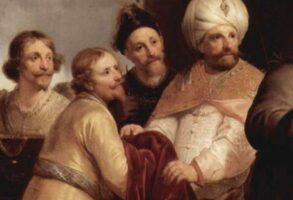
Published December 9, 2015
George Weigel's weekly column The Catholic Difference
It’s been a good reading year and I highly recommend the following to the readers on your Christmas (not “holiday”) shopping list:
God or Nothing, by Cardinal Robert Sarah (Ignatius Press): It was the book being discussed at Synod-2015 and with good reason, for this interview-style autobiography of a life of faith is moving, insightful, and a wonderful testament to the fruits of the European mission to Africa in the early twentieth century. As African Catholicism now challenges its Euro-parent to rediscover the gift of faith that Europe once gave others, God or Nothing is also an invitation to meet a man whose service to the universal Church may not end with his current post in the Roman Curia.
Church of Spies: The Pope’s Secret War Against Hitler, by Mark Riebling (Basic Books): It’s scandalous that this deeply-researched study of Pius XII’s involvement in plots to depose Adolf Hitler has been largely ignored by the mainstream press, but the reason why isn’t hard to guess—Church of Spies confounds the “Hitler’s Pope” rubbish that Catholic-bashers find useful. It’s a great read, so give it on those grounds; but it’s morally permissible if you give it to annoy the New York Times.
Vatican Council Notebooks, by Henri de Lubac (Ignatius Press): There are many Vatican II memoirs available, but Father de Lubac’s is more even-tempered than Yves Congar’s My Journal of the Council (Liturgical Press); the de Lubac volume is also a model of editing and annotation. Louis Bouyer’s Memoirs (Ignatius Press), recently published, include some interesting nuggets about Vatican II and its liturgical aftermath.
How God Became King: The Forgotten Story of the Gospels, by N.T. Wright (HarperOne): Sound, accessible biblical commentary that’s informed, but not distorted, by historical–critical scholarship is always welcome, and the former Anglican bishop of Durham is its leading practitioner in the Anglosphere. Give it to a bishop, priest, and/or deacon on your list, gently reminding him or them that expository preaching is essential, and that Dr. Wright is a master-guide to breaking open the gospel text so that we see the world more clearly through it. How God Became King also makes wonderful spiritual reading for Advent or Lent.
Truth Overruled: The Future of Marriage and Religious Freedom, by Ryan T. Anderson (Regnery): Your best guide to the debate that the Supreme Court has tried to end, but hasn’t.
Destiny and Power: The American Odyssey of George Herbert Walker Bush, by Jon Meacham (Random House): A splendidly crafted, richly detailed reminder that decency and chivalry were no obstacles to American high office in our lifetime.
Imperium and Conspirata, by Robert Harris (Gallery Books): Harris’s trilogy of novels about Cicero will be completed in January with a third volume, Dictator; there, our hero runs afoul of the nasty Caesars, Julius and Octavian, but that’s to get ahead of the story. The first two volumes will whet the appetites of those who relish first-rate historical fiction, in preparation for the denouement.
Devotion, by Adam Makos (Ballantine): The story of the U.S. Navy’s first African-American carrier pilot, Jesse Brown, and his white squadron-mate and friend, Tom Hudner, is touching in its own right and a timely antidote to the politically-correct madness of recent months on campuses and elsewhere. If you can avoid choking-up while reading what President Harry Truman said to Hudner when presenting him the Congressional Medal of Honor in the presence of Jesse Brown’s widow, Daisy, you have more emotional iron in you than I do.
The Inimitable Jeeves; Very Good, Jeeves; Right Ho, Jeeves; Thank You, Jeeves; The Code of the Woosters; and Stiff Upper Lip, Jeeves, by P.G. Wodehouse (Norton or Touchstone): It’s going to be a tough year, 2016; it’s impossible to stay grumpy reading Wodehouse. So start now, and invite lugubrious or distraught family and friends to the party.
And, if I may note my own two recent offerings: The revised and expanded Letters to a Young Catholic (Basic Books) is intended for the young from sixteen to (at least) eighty-plus, while City of Saints: A Pilgrimage to John Paul II’s Kraków (Image) will, I hope, be welcomed by all attending World Youth Day-2016, in person or in spirit, in print or in the all-color-photography e-book.
George Weigel is Distinguished Senior Fellow of Washington, D.C.’s Ethics and Public Policy Center, where he holds the William E. Simon Chair in Catholic Studies.









